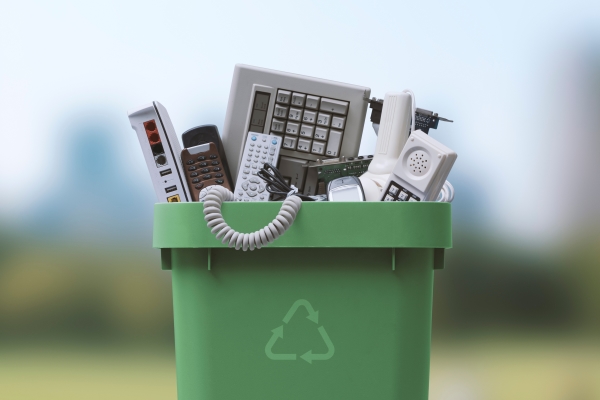
In today’s business landscape, sustainability has become a cornerstone of responsible corporate practices. Companies are increasingly recognising that their long-term success is intertwined with their environmental impact, driving the adoption of green initiatives. Among these, the recycling of IT equipment has gained significant attention, particularly in large corporations where the volume of electronic waste (e-waste) is substantial. As technology evolves rapidly, so does the turnover of devices, leading to an urgent need for effective recycling strategies. Addressing e-waste is crucial, not only to mitigate environmental harm but also to comply with regulations and enhance corporate social responsibility.
The Growing Concern of E-Waste
E-waste, or electronic waste, refers to discarded electronic devices, including computers, smartphones, and other IT equipment. Globally, e-waste reached a staggering 62 million tonnes (Mt) in 2022, marking an 82% increase from 2010. This figure is projected to rise by another 32%, reaching 82 million tonnes by 2030. The UK contributes significantly to this growing problem, with high rates of technology consumption and disposal.
Improper disposal of e-waste poses severe environmental hazards, as many electronic devices contain toxic substances such as lead, mercury, and cadmium. When these materials are not properly managed, they can leach into soil and water, causing contamination that affects ecosystems and human health. Additionally, the breakdown of these materials releases greenhouse gases, contributing to climate change. Addressing e-waste is therefore not just a matter of waste management but a critical environmental and public health issue that demands urgent attention.
The Role of Large Corporations in IT Equipment Recycling
 Large corporations bear significant responsibility in promoting environmental sustainability, given their substantial influence and resource capabilities. Corporate responsibility extends beyond profit-making to include the minimisation of environmental impact, making IT equipment recycling a critical component of their sustainability strategy. Recycling IT equipment not only aligns with corporate social responsibility (CSR) goals but also presents a compelling business case.
Large corporations bear significant responsibility in promoting environmental sustainability, given their substantial influence and resource capabilities. Corporate responsibility extends beyond profit-making to include the minimisation of environmental impact, making IT equipment recycling a critical component of their sustainability strategy. Recycling IT equipment not only aligns with corporate social responsibility (CSR) goals but also presents a compelling business case.
By partnering with specialists like Recycling Your IT, we can help you with your e-waste and enhance your brand reputation by demonstrating environmental responsibility.
Challenges in IT Equipment Recycling
Despite growing awareness of the importance of IT equipment recycling, large organisations face significant challenges in implementing effective recycling programmes. Common barriers include financial constraints, as the cost of properly recycling equipment can be high, particularly when considering secure data destruction and the complexity of recycling diverse materials. Logistically, managing the collection, transportation, and processing of outdated IT assets across multiple locations presents a significant challenge. Technologically, the rapid advancement of electronics results in a wide variety of equipment, each requiring different recycling processes, making standardisation difficult.
There is often a gap between corporate sustainability goals and actual implementation. While many companies set ambitious recycling targets, these goals can be undermined by a lack of internal alignment, insufficient employee engagement, and inadequate infrastructure. Overcoming these challenges requires a holistic approach, including clear policies, strategic partnerships, and investment in technology and education to bridge the gap between intention and action.
Benefits of IT Equipment Recycling
 IT equipment recycling offers numerous benefits, both environmental and social. Environmentally, it plays a crucial role in reducing landfill waste, preventing harmful toxins from seeping into soil and water. By recovering valuable materials such as metals and plastics, recycling also conserves natural resources, reducing the need for new raw materials. This process significantly lowers carbon footprints by minimising the energy required for manufacturing new products.
IT equipment recycling offers numerous benefits, both environmental and social. Environmentally, it plays a crucial role in reducing landfill waste, preventing harmful toxins from seeping into soil and water. By recovering valuable materials such as metals and plastics, recycling also conserves natural resources, reducing the need for new raw materials. This process significantly lowers carbon footprints by minimising the energy required for manufacturing new products.
Socially, IT equipment recycling aligns with corporate social responsibility (CSR) objectives, demonstrating a company’s commitment to sustainable practices. By supporting recycling initiatives, corporations enhance their public image and contribute to positive social outcomes.
By integrating effective recycling strategies, businesses can play a pivotal role in addressing the growing e-waste problem. To achieve these goals, partnering with specialists like Recycling Your IT ensures that corporations not only meet their sustainability objectives but also lead by example in creating a cleaner, greener future. Now is the time for businesses to take decisive action and make IT equipment recycling a core part of their operations.
